You have a user-friendly ecommerce website. You sell quality products that people actually need and want to buy. Yet, your ROI isn’t as high as you’d like.
This means there’s room for improvement somewhere within your operations. Or maybe it’s your approach to sales and customer journey that requires tweaking?
It’s probably all of the above. Especially if you’re not deploying modern automation tools.
This is where AI in ecommerce comes into play.
Business leaders, as reported by Forbes, claim that AI agents and AI chatbots for ecommerce increase sales by 67%. Moreover, McKinsey’s research shows that AI ecommerce can increase customer retention by 10-15% with personalized marketing.
The need and the benefits are there. Now let’s see how AI is changing ecommerce.
Boost your sales using AI in ecommerce
Why AI ecommerce matters now more than ever
AI in e-commerce is transforming how businesses operate and interact with customers, offering a wide range of benefits. AI algorithms analyze customer data to personalize experiences, predict behavior, optimize operations, and automate tasks, leading to increased efficiency, revenue, and customer satisfaction.
Read more: Learn how customer service automation can help you scale while saving money.
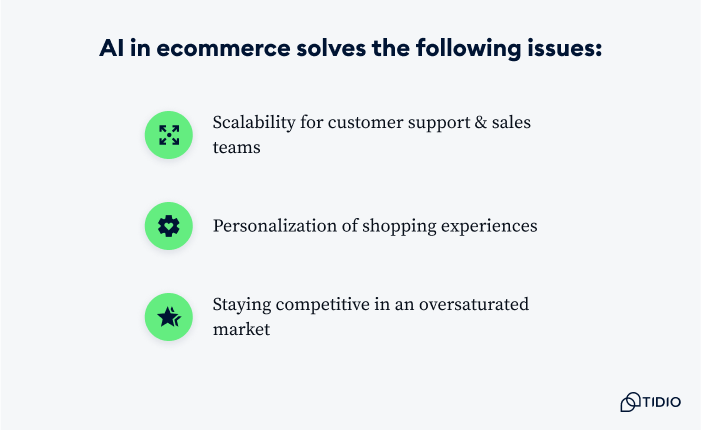
As of 2025, 80% of retail and ecommerce businesses are using or planning to use AI bots in the near future. That includes everything from basic chatbots to advanced AI agents powered by large language models (LLMs).
Here’s why AI in ecommerce is on the rise.
Human customer support is stretched thin
Even a mid-sized ecommerce site can get thousands of customer inquiries per day. Most customer service teams can’t keep up. Response times lag. Customers bounce. Leads fall through the cracks.
AI agents solve these issues by handling high volumes of customer inquiries instantly and around the clock. Unlike human agents, they don’t get overwhelmed or need breaks, so response times stay consistently fast, even during traffic spikes.
AI agents can triage requests, provide immediate answers to common questions, and escalate complex issues to human reps only when necessary. Your customers get timely, accurate support that reduces bounce rates and improves satisfaction.
More importantly, AI keeps leads engaged and offers real-time product suggestions, while capturing their information and nudging them toward conversion instead of letting them fall through the cracks.
Read more: Learn what canned responses are and how they can help your ecommerce.
Shoppers expect more
Over 80% of global business leaders say that personalized experiences increase consumer spending. Also, almost 50% of customers have purchased a product that they had not planned to buy due to personalized recommendations.
Read more: Learn the difference between AI agents and AI chatbots for your B2B ecommerce needs.
Competition is fierce
Thousands of ecommerce sites launch every day. Margins are tight. Attention spans are shorter than ever. What separates winners from losers isn’t just price or product. It’s how well you use your tech stack to deliver better experiences. In fact, 88% of consumers say that the customer experience a company provides matters as much as its products or services.
In a crowded market where products are similar and prices competitive, this kind of intelligent automation becomes the edge that sets top-performing brands apart.
Direct benefits of AI agents in ecommerce
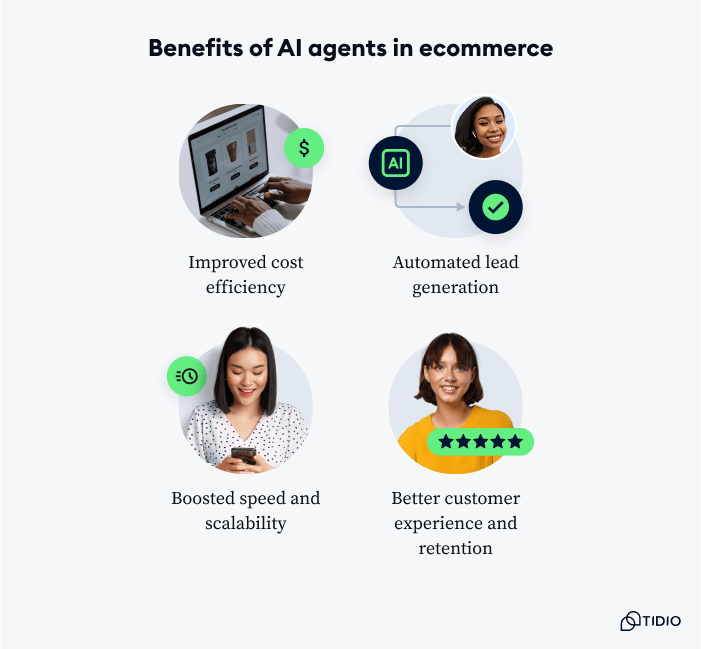
AI agents boost revenue by increasing conversions, cutting support costs, and improving the customer journey. They deliver results without the overhead of growing your human team.
- Cost efficiency: AI agents lower support costs. You need fewer agents, shorter shifts, and less manual triage. Instead of scaling your team linearly, you scale output exponentially.
NOTE: You can estimate your savings with Tidio’s ROI calculator. - Lead generation: AI agents are lead generation tools that qualify leads in real time, capture emails during conversation, and pass warm leads to human reps when needed. Some businesses report 2x higher conversion rates when AI agents handle the first touchpoint.
- Speed and scalability: Humans can’t scale to handle thousands of simultaneous sessions. AI can. With no drop in quality or accuracy. That means every visitor gets a response instantly.
- Customer experience and retention: Faster answers, smarter suggestions, 24/7 availability—AI agents help you meet (and exceed) customer expectations. This translates into higher CSAT scores, repeat purchases, and lower churn.
Read more: Find out how to boost ecommerce customer retention.
AI agents vs. basic automation
Not all ecommerce AI tools are created equal. AI agents act as digital sales and support reps that scale instantly. Unlike basic automation tools, like an FAQ chatbot, for example, AI agents adapt to context and learn over time. They can even handle complex tasks and act as a virtual sales rep that actually closes deals.
Here’s a breakdown:
| Feature | Basic chatbot | AI agent (LLM-powered) |
| Predefined responses | Yes | No |
| Self-learning capabilities | No, or limited | Yes |
| Natural language processing | No | Advanced (LLM-level fluency) |
| Personalization per user data | No, or limited | Yes (real-time context aware) |
| Task handling | FAQs only or limited flows | Complex tasks & dynamic actions |
The tech behind ecommerce AI agents
AI agents use large language models and machine learning combined with real-time data, and that’s how they understand customer intent. Then they act on it automatically and instantly.
The result? Highly personalized experiences and automated decisions. Something that used to require human input, 24/7.
AI agents use:
- LLMs to understand and generate human-like language
- Machine learning to adapt to new behaviors and trends
- Real-time data (like behavior) to deliver relevant, context-aware responses
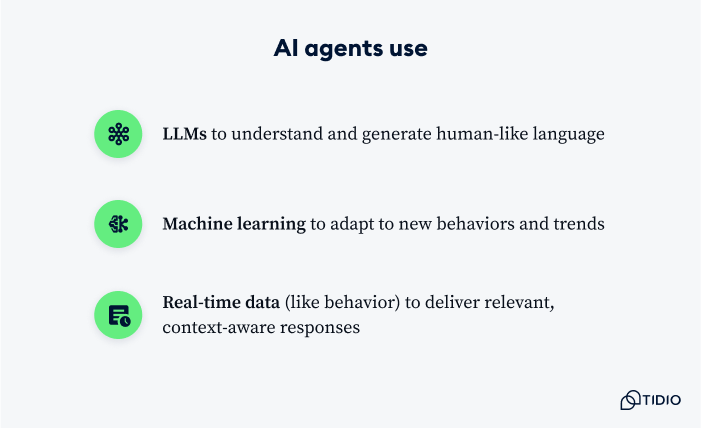
They connect to your product catalog, pricing engine, CRM, and order history. Then, these tools analyze user behavior in real time and make decisions, like recommending products or resolving complaints.
Read more: Find out which free CRM software is right for your business.
AI use cases in ecommerce with real case studies
AI agents aren’t just for answering questions. They help shoppers find products, recover carts, handle post-purchase issues, and close sales in real time. Let’s first take a look at the most common AI use cases in ecommerce that drive measurable business value right away; then we’ll provide tangible case studies that depict actual numbers and metrics.
Customer service automation
AI agents can handle 70–90% of inbound questions. Not just FAQs, but delivery issues, refund requests, or complex order inquiries.
For example, when a customer asks about a delayed order, the AI agent checks shipment tracking, confirms the delay, offers an apology, and issues a discount code. All on its own, without any human help.
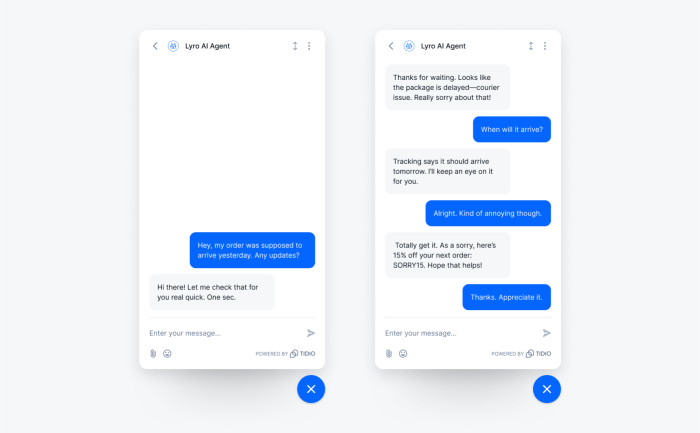
Read more: Learn key tips on how to improve your retail customer service.
Boost sales and automate your lead generation with Tidio
Personalized recommendations
The AI agent examines the customer’s browsing history, purchase behavior, and preferences. Then, it suggests products that fit the customer’s style, budget, or intent.
Example: A shopper browses running shoes. The AI agent recommends similar models in stock, highlights ones on sale, and even cross-sells accessories like socks or insoles.
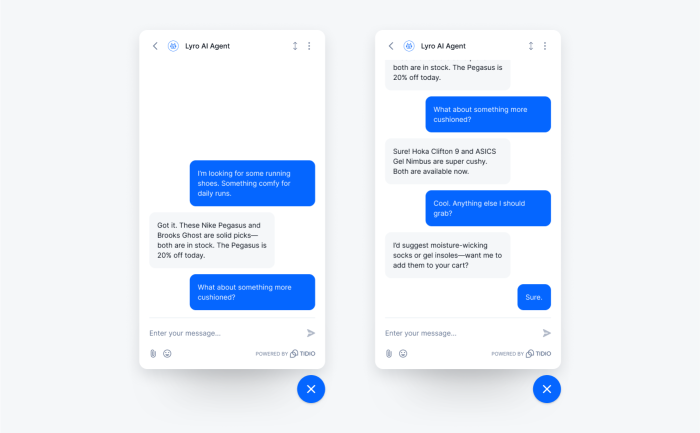
Read more: Learn crucial AI marketing statistics to see how modern marketing is being changed by AI tech.
Product discovery
Instead of relying on clunky search bars or filters, shoppers can talk to AI agents conversationally.
Example: “I’m looking for a gift for my mom under $100—she likes gardening.” The agent finds relevant products using metadata, reviews, and sentiment analysis.
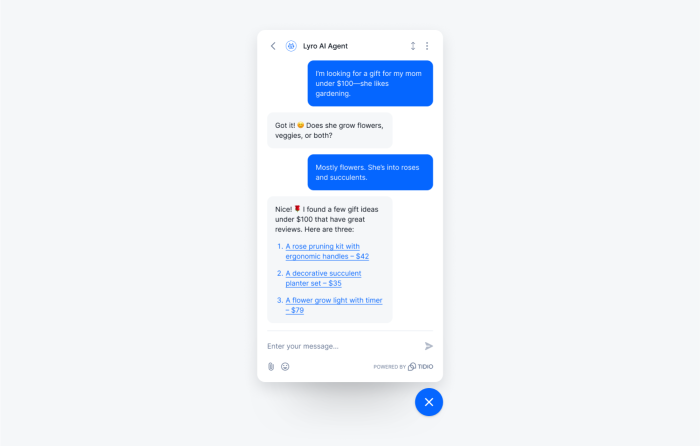
Read more: Learn how to improve your product marketing strategy.
Lead capture and sales support
AI agents proactively engage high-intent visitors, answer objections, and entice users to complete purchases.
Example: A user hovers over a product page for a couple of minutes. The AI agent pops up with an action to increase conversion rates.
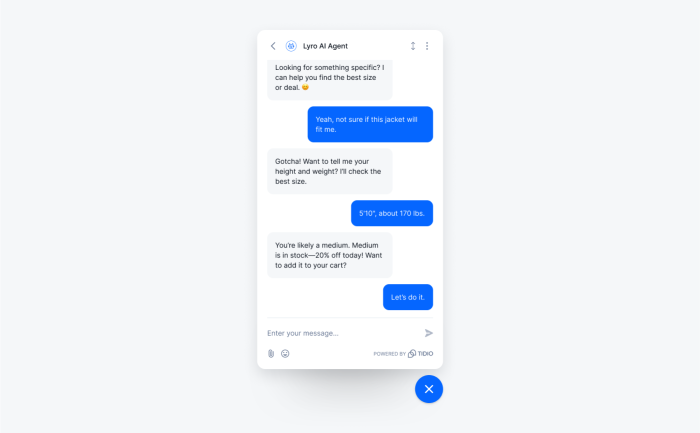
Read more: Find out how to use live chat lead generation to boost sales.
Now, to really understand the ROI benefits of AI for ecommerce, let’s look at real examples. The stories below show how companies use Tidio’s AI solutions for ecommerce to capture more leads and increase revenue in a smart and cost-effective way.
How eye-oo increased sales by 25% with the Lyro AI agent

European eyewear retailer eye-oo was losing customers due to slow and inconsistent responses across customer service channels. Their team couldn’t keep up with customer questions about shipping, returns, and orders, especially during evenings and weekends.
To fix this, eye-oo implemented Tidio’s Lyro AI agent and live chat widget. This setup allowed them to automate answers to common questions while still offering live agent support when needed.
The impact was clear. Tidio’s client managed to:
- Increase sales by 25%
- 5x more conversions
- Reduce product returns by 15%
- Automate 70% of customer queries via Lyro
- Maintain a 95% conversation rating
The AI assistant worked 24/7, helping shoppers get the information they needed to buy with confidence, while minimizing returns and abandoned carts.
Read more: Check out the full eye-oo case study.
How ADT Security Service boosted sales by 17% with Tidio

ADT Security Service, a global leader in home and business security, faced challenges with slow response times and low customer satisfaction. Their existing support tool wasn’t meeting expectations.
To address this, ADT implemented Tidio’s live chat and AI chatbot for ecommerce. This allowed for real-time assistance and efficient ticket routing.
The impact was significant. ADT:
- Increased lead-to-sale conversions from 44% to 61%
- Reduced missed conversations by 74%
- Handled 45% more customer interactions
- Improved customer satisfaction by 30%
- Decreased average response time by 22%
Read more: Find out more by reading the entire ADT case study.
How Procosmet increased sales by 23% after switching to Tidio

Procosmet, an Italian beauty brand, faced challenges with managing customer orders and support efficiently. Their previous system required agents to manually handle tasks like order cancellations and refunds, leading to slow response times and customer dissatisfaction.
To address these issues, Procosmet implemented Tidio’s live chat, AI chatbots, and analytics tools. This integration allowed ecommerce customer service agents to manage orders directly from the chat window, streamlining the process and reducing response times.
The results were significant:
- Sales increased by 23% after adopting Tidio’s Plus plan, which consolidated customer service tasks into a single platform.
- Lead generation grew fivefold, with monthly leads increasing from 10–30 to over 100, thanks to an AI chatbot for ecommerce collecting contact information and subscribing users to newsletters.
- Conversion rates stabilized and improved by 27%, as chatbots provided consistent support and engagement across the website.
- Customer satisfaction ratings rose from 3.8 to 4.7 out of 5, based on feedback from 704 customers, due to personalized and efficient support.
Read more: Check out the entire Procosmet case study.
Key steps to integrate AI agents into your ecommerce stack
Start by identifying friction points in your funnel, then plug in AI where human teams fall short. Make sure your AI agent for ecommerce works with your existing platforms like Shopify or WooCommerce, and scale gradually after testing early results.
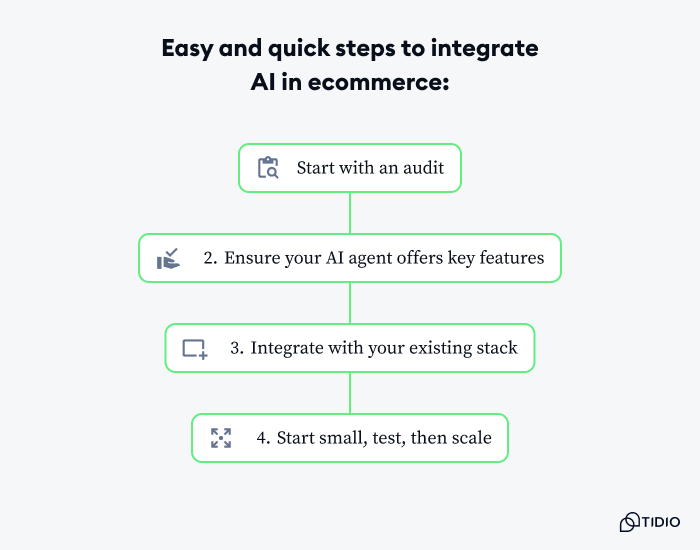
Start with an audit
Map out your current customer journey. Identify where delays, drop-offs, or support overload happen.
Look for:
- High-volume support tickets
- Abandoned carts
- Low conversion pages
- Underperforming lead forms
These are entry points for AI agents.
Look for specific features
Not all AI agents or AI for ecommerce tools are worth your time. Ecommerce AI solutions should go beyond canned replies. Features like LLM-powered intelligence, ecommerce platform integrations, and real-time personalization separate true AI agents from legacy chatbots.
Look for:
- LLM integration: not just rule-based chat
- Native ecommerce support: syncs with your product catalog, cart system, and customer data
- Multilingual capabilities: like multilingual live chat and AI agents (especially important for global stores)
- Omnichannel support: works on your site, mobile, WhatsApp, Messenger, etc.
- Real-time learning: updates based on new products, trends, and customer feedback
Integrate with your existing stack
Most modern brands that pursue AI-powered ecommerce use Shopify, Magento, WooCommerce, or BigCommerce. Your AI agent should integrate natively with these platforms.
Also, check compatibility with:
- CRM tools (HubSpot, Klaviyo)
- Email platforms (Mailchimp, ActiveCampaign)
- Analytics and business intelligence tools
- Email and social media platforms
Read more: Learn the main differences between CRM and ticketing system platforms.
Start small, test, then scale
Pick one use case first, like cart abandonment or product discovery. Then run A/B tests and track KPIs (ecommerce conversion rate, response time, cart recovery). Now, it’s time to iterate. Once the ROI is clear, expand to other use cases.
Measuring ROI from AI in ecommerce
If your AI tools for ecommerce aren’t driving revenue or saving costs, they’re not doing their job. Track metrics like average order value, customer lifetime value, and churn to see if the agent is actually moving the needle. Moreover, focus on conversion lifts and support efficiencies to measure real impact.
Key performance indicators to track:
- Average order value: does AI increase upsells?
- Customer lifetime value: are customers buying more, more often?
- Customer acquisition cost: does AI reduce reliance on paid ads or increase lead conversion?
- Churn rate: does AI reduce customer drop-off post-purchase?
- Customer satisfaction score: are people happier with faster, smarter support?
- Cart recovery rate: does AI bring shoppers back before they abandon their carts for good?
- Time to first response: does AI help respond to customer queries instantly, 24/7?
- Support resolution time: is AI speeding up how quickly issues get solved?
Now, attribution can be tricky.
AI agents influence multiple stages, including discovery, conversion, retention, etc. Use multi-touch models or segment-based testing to isolate the impact. Don’t rely only on last-click attribution. Look at assisted conversions and conversation-based conversion rates, too.
Read more: Learn pro tips on conversational AI customer service.
Start with Lyro AI agent and experience an immediate ROI boost
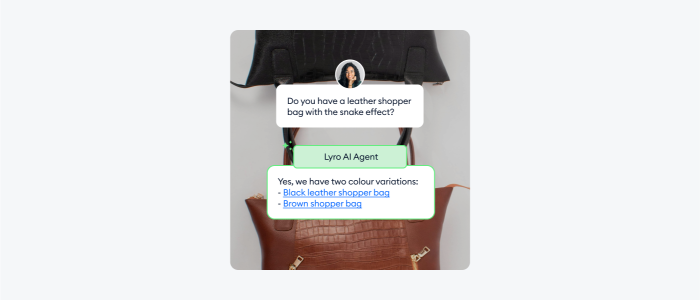
One of the most effective AI agents for AI ecommerce today is Lyro, built by the team at Tidio.
Unlike basic bots, Lyro is a fully autonomous AI agent perfect for AI in ecommerce, as it is trained to handle up to 70% of customer service inquiries out of the box.
Why do ecommerce brands choose Lyro?
- LLM-powered intelligence: Lyro is an AI ecommerce assistant that uses natural language understanding to engage users in real conversations, not just button clicks or flowcharts.
- 24/7 instant support: always online, always fast.
- Self-learning: it adapts to your business, learning from conversations to improve over time.
- Seamless integrations: Lyro works with Shopify, WooCommerce, Magento, and more.
- No coding required: you don’t need developers to launch it. Plug it in and go live in minutes.
- Personalization built-in: Lyro pulls customer data, order history, and product info to deliver personalized answers and suggestions.
- Multilingual: supports global audiences in their native languages.
Lyro acts as an AI assistant for ecommerce, helping stores reduce support costs by up to 40%, increase conversion rates by 27%, and cut response times from hours to seconds. It’s also been shown to boost customer satisfaction scores by 18%, making it a powerful tool for both efficiency and experience.
Lyro’s not just an AI chatbot for ecommerce. It’s a revenue driver.
For ecommerce brands looking to stay competitive and scalable, Lyro is an easy win as the best AI chatbot for ecommerce. It pays for itself fast and keeps improving over time.
Boost revenue with Lyro as your AI in ecommerce solution

